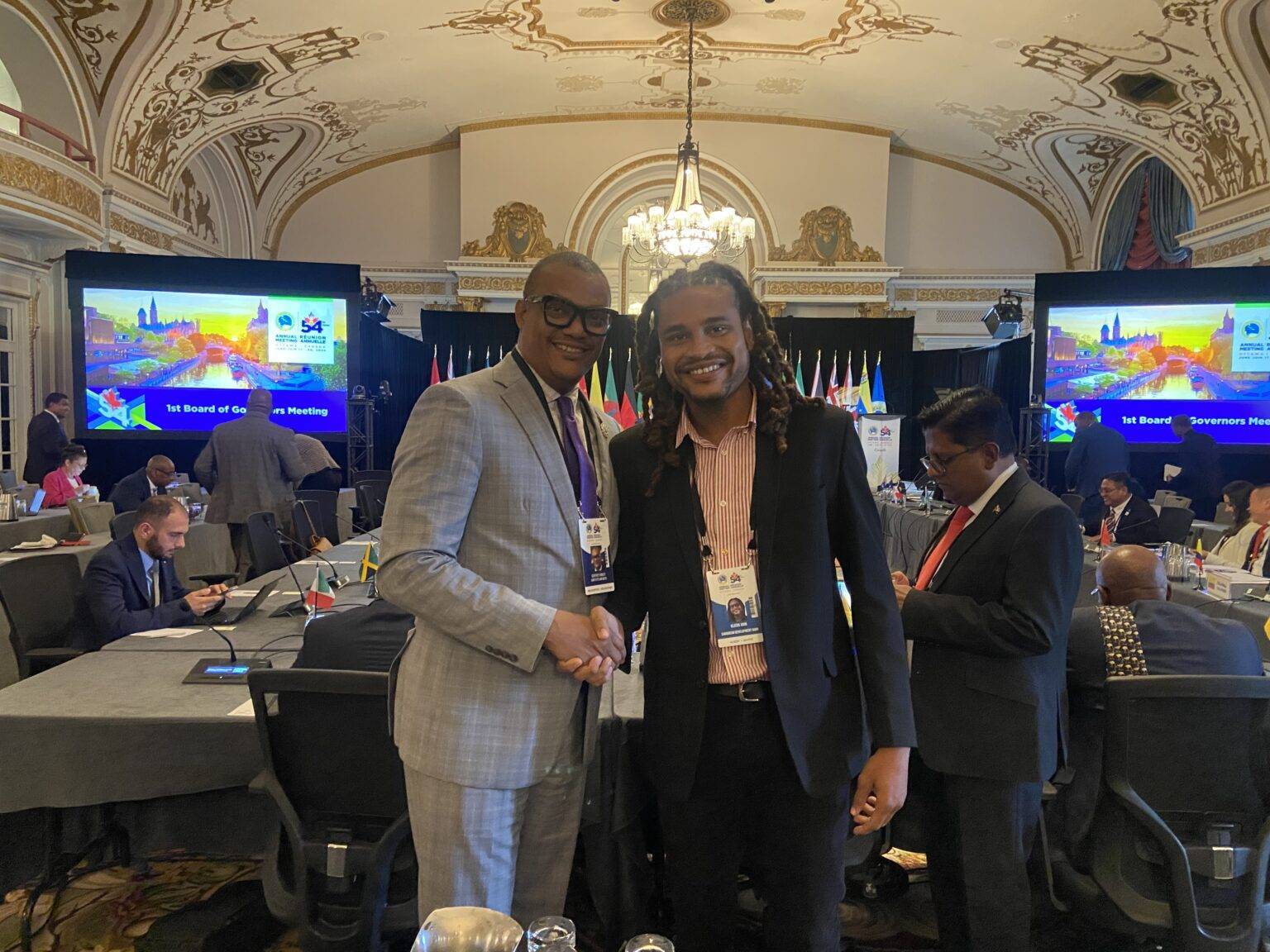June 20, 2024 – Twin-Island Cinema: St. Kitts-Nevis producer and researcher, Klieon John, proposed a framework of radical technological, spatial, and media innovations to address climate and economic challenges, for the Caribbean at the Youth for Innovation and Resilience Forum of the 54th Annual Meeting of the Board of Governors of the Caribbean Development Bank in Ottawa, Canada on June 19, 2024.
The highly anticipated event convened leaders, innovators, and young visionaries from across the Caribbean to tackle pressing regional challenges with forward-thinking solutions. In his keynote, “Innovating Resilience: A Radical Reimagining of Caribbean Futures,” John emphasized the need for transformative approaches in technology, spatial planning, new media, and Caribbean identity to effectively respond to the region’s emerging issues, particularly those related to climate change and economic instability.
Re-Defining Resilience
Reflecting on insights shared at adjacent forums such as”Haiti Now: Development Priorities and Interventions,” John underscored the broader context of resilience in the Caribbean, in response to the assertion that ‘resilience defines Caribbean people.’
“Resilience is woven into our history and culture. It’s a powerful defining trait of the Caribbean spirit,” John remarked. However, he also raised critical questions about whether this reactive perspective on resilience might limit the region’s potential for innovation.
“Being defined by resilience often connotes reacting to hardship, being shaped by events beyond our control,” John said. “This passivity, while showcasing our strength, suggests we are always in response mode—defined by an ‘afterward’ rather than a ‘forward’. We need to consider whether this approach limits our access to potential opportunities and innovations.”
John challenged the region to redefine resilience from a proactive stance, embracing curiosity, inspiration and initiative to create new opportunities for wealth and prosperity rather than recovery from catastrophe. “As a region long defined by its resilience, we now have the experience and the right to redefine resilience for ourselves,” he concluded.
Radical Evolutions in Technology and Spatial Planning
John’s address highlighted the critical role of technology and innovative spatial planning in crafting a resilient future for the Caribbean. He referenced his research and design project under the prestigious2024 Tilting Axis Research Fellowship, ‘Nieuwe Bohío: A Digital Retrospective on Indigenous Caribbean history, culture, and mythology, where he proposes a visionary approach to optimize transportation systems both within and between islands, addressing inefficiencies that hinder economic and social cohesion. “An optimized transit system is not just a convenience; it is a fundamental tool for productivity, social cohesion, and resilience through wealth creation,” John asserted.
Drawing from his research, John emphasized that effective spatial organization goes beyond the mere positioning of physical materials or people. It involves managing the dynamic movement of populations within an evolving cultural and economic landscape. “As industrialization and globalization reshape our society, we must rethink how we support the movement of people to foster resilience and innovation,” he explained.
Re-imagining Tourism as a Tool for Advancement
In a thought-provoking segment, John challenged the audience to reimagine the Caribbean’s relationship with tourism. He proposed a review of existing tourism-oriented infrastructure to enhance local mobility, productivity and socio-economic empowerment.
“Inter-regional transit is costly and inconvenient, with air travel routes that do not sufficiently reflect the nobility needs of an evolving population and business landscape,” asserted John. “Domestically, in many Caribbean Small Island Developing States (SIDS) the combination of single carriage roads, a lack of national transport services and increased importation of private vehicles leads to congestion and limited mobility, reducing productivity, access, and inclusivity,” he added.
John proposed that by adjusting policy, culture, and practice with current cruise liners, we can optimize these routes for better regional transit. Further, he asserted that some islands may be missing opportunities to utilize existing infrastructure to enhance ground transportation.
“In St. Kitts for instance, a functional train line that almost circumnavigates the entire island is maintained only as a post-plantocracy relic for tours and sightseeing, offering no support to local mobility and productivity. There may be ways to revise and repurpose this model to enhance local productivity and ease of movement,” he offered.
Re-imagining Caribbean Indigeneity
A central theme of John’s presentation was the re-imagining of Caribbean indigeneity. He called for a shift from the traditional, static views rooted in historical and colonial frameworks to a contemporary understanding that embraces the fluid and evolving nature of indigenous identities. “Indigenous identity is not just about survival; it holds the potential for innovation and pioneering,” John stated.
He cited examples such as the Rastafari movement, “which emerged in the Caribbean not in response to some catastrophic actus dei, but as an inspiration-driven, radical, new initiative characterized by self-definition rather than survival. Rastafari redefined what it means to be Caribbean, showcasing our region’s capacity for ideological innovation that can influence the world” he noted.
By recognizing the dynamic and self-determined nature of contemporary indigeneity, John argued that the Caribbean can foster cultural revitalization, sovereignty, and empowerment. “We need to redefine our understanding of indigeneity to unlock new perspectives and solutions for our region’s challenges,” he urged.
“So adopting a contemporary understanding of indigeneity, promotes inclusive social justice and supports comprehensive sustainable development, rooted in self-determination, adaptability, intersectionality, and innovation.This ultimately enhances our efforts to define and design a resilient future”, he added.
A Call to Action
John concluded his message with a compelling call to action, urging the Caribbean to adopt a proactive and visionary approach to resilience. “By embracing radical innovation in technology, spatial planning, new media, and our understanding of identity, we can lead our region to a future of unprecedented potential,” he declared.
###









